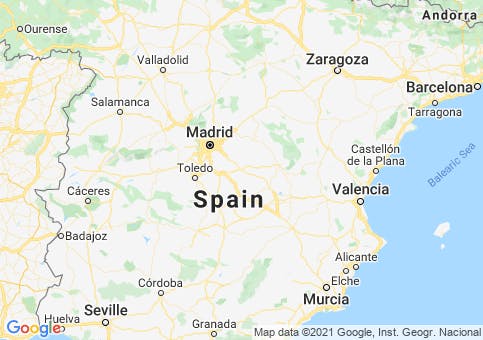Retiring in Spain has become increasingly popular among North Americans in recent years. Spain is known for its beautiful beaches, rich history and culture, and warm climate. All of these factors make it an attractive destination for retirees, remote workers, and digital nomads seeking a relaxed and enjoyable lifestyle. Additionally, Spain offers a high quality of life at a more affordable cost compared to other popular retirement destinations in Europe.
One of the biggest benefits of living in Spain is the affordable cost of living. People enjoy a comfortable lifestyle without breaking the bank, as the cost of living is generally lower than in many North American cities. Housing is also relatively affordable, with many retirees purchasing or renting properties in charming coastal towns or picturesque rural areas.
The warm weather is another major draw. Most of the country enjoys a Mediterranean climate with mild winters and hot summers, making it an ideal destination for those seeking year-round warmth and sunshine. Retirees can spend their days exploring the beautiful countryside, relaxing on the beach, or indulging in the country's delicious cuisine and wine.
Preparing to Relocate
Retiring in Spain is a dream come true for thousands of people. However, making sure you’ve taken care of a few steps before making the move is crucial. Here are some key things to consider:
Obtain the correct visas/residency permit: You’ll need to obtain a visa or residency permit that allows you to live in Spain for an extended period. All non-EU citizens can only stay in the Schengen agreements countries for a maximum of 90 out of 180 days. The most common visa for retirees is the non-lucrative visa, which only requires proof of sufficient funds, health insurance, and a clean criminal record.
Get Your Free Spain Report Today!
Get Your Free Spain Report Today!
Learn more about the lower cost of living in Spain and other countries in our free daily postcard e-letter. Simply enter your email address below and we'll also send you a FREE REPORT — Live the Good Life in Sunny, Affordable Spain.

By submitting your email address, you will receive a free subscription to IL Postcards and special offers from International Living and our affiliates. You can unsubscribe at any time, and we encourage you to read more about our Privacy Policy.
Research the best places to live for you. Spain is a diverse country with many different regions, each with its own unique culture, climate, and lifestyle. Researching and visiting different areas is important to find the one that best suits your needs and preferences. Some popular retirement destinations in Spain include the Costa del Sol, Costa Blanca, Catalunya, and the Canary Islands.
Consider your healthcare options. Spain has a public healthcare system that is available to residents and is generally of good quality. However, retirees may also want to consider private healthcare options, which can provide faster, as well as more personalized care.
Spain is generally a safe country, but everyone still needs to take precautions to ensure their safety. This may include choosing a safe neighborhood to live in, being aware of pickpocketing and other petty crimes, and taking steps to secure their home.
Cost of Living in Spain
The cost of living in Spain is generally lower than in many North American cities, but prices can vary depending on the region and the lifestyle you choose. Here's a breakdown of the average costs of housing, food, and transportation in Spain, compared to North America:
Housing: The cost of housing in Spain is often significantly lower than in North America, especially in smaller towns and rural areas. For example, in the metropolitan capital of Madrid, the average monthly rent for a one-bedroom apartment in the city center is between $1,088 to $1,415, while in smaller towns, it can be as low as $545 to $762. In comparison, the average monthly rent for a one-bedroom apartment in a major North American city is $1,200 to $2,000.
Food: The cost of food in Spain is generally lower than in North America, with fresh produce and local specialties available at affordable prices. A meal at a mid-range restaurant can cost $11 to $16, while groceries for a week can cost around $55 to $76.
Transportation: The cost of transportation in Spain is also usually lower than in North America, with public transportation options available at affordable prices. A single bus or metro ride can cost $1 to $2, while a monthly pass can cost $40 to $60. In comparison, a single bus or metro ride in North America can cost $2 to $4, while monthly passes can cost $80 to $120.
There are several ways you can save money while living in Spain. Shopping at local markets offering fresh produce, meats, and other foods are available at lower prices than in supermarkets. Then, preparing these foods at home will further save you money.
Public transportation in Spain is affordable and efficient, so consider using buses or metros instead of taxis or renting a car. Additionally, all the larger cities have a bicycle sharing company which is even cheaper than buses or metros.
Spain has countless free cultural and recreational activities, and many cities have numerous festivals throughout the year. Additionally, most museums are free to visit on the first Sunday of every month.
Overall, Spain can offer a higher quality of life at a more affordable cost than North America. By following these tips and being mindful of your expenses, you can enjoy a comfortable and fulfilling lifestyle while living in Spain.
Healthcare in Spain
The healthcare system in Spain is a universal and publicly funded system, available to all legal residents and citizens. As a retiree living in Spain, you’ll be eligible for public healthcare coverage through the Spanish National Health System, which provides comprehensive medical services, including primary care, specialist care, and hospitalization.
To access public healthcare in Spain, you will need to obtain a health card, which can be obtained through your local health center or hospital. The card is free of charge and will give you access to all public healthcare services in Spain.
In addition to the public healthcare system, Spain also has a robust private healthcare sector, which can provide faster access to medical services and a higher level of personalized care. Private healthcare has a low cost, but many retirees supplement their public healthcare coverage with private insurance.
Popular retirement destinations have a high concentration of English-speaking doctors and medical staff, making it easier for retirees to navigate the healthcare system and communicate their medical needs. The quality of healthcare facilities in Spain is high, with modern facilities and advanced medical technology available. In addition, Spain has a high number of medical professionals per capita, with a strong emphasis on preventative care and patient education.
Get Your Free Spain Report Today!
Get Your Free Spain Report Today!
Learn more about the lower cost of living in Spain and other countries in our free daily postcard e-letter. Simply enter your email address below and we'll also send you a FREE REPORT — Live the Good Life in Sunny, Affordable Spain.

By submitting your email address, you will receive a free subscription to IL Postcards and special offers from International Living and our affiliates. You can unsubscribe at any time, and we encourage you to read more about our Privacy Policy.
Safety in Spain
Spain is generally a safe country with a low crime rate, but, like anywhere, taking precautions to ensure your safety is still important. Here are some safety concerns to be aware of and tips for staying safe in Spain:
Pickpocketing and petty theft: Pickpocketing and petty theft are common in tourist areas and on public transportation. To avoid becoming a victim, keep your valuables out of sight and be aware of your surroundings. Consider using a money belt or cross-body bag to secure your belongings.
Street crime: Violent crime is rare in Spain, but street crime can occur, especially in larger cities. Avoid walking alone at night and in poorly lit areas. Stick to well-lit streets and populated areas and stay aware of your surroundings.
Scams and frauds: Scams and frauds targeting tourists can occur in Spain. Do not give money to anyone for a place to live without physically visiting the property yourself. Be wary of anyone approaching you on the street offering services or trying to sell you something. Use only reputable tour operators and taxi companies, and avoid carrying large amounts of cash.
Traffic safety: Traffic can be heavy in Spanish cities, and drivers can be aggressive. Beware of scooters; in large cities, there are thousands of them, and they don’t always obey traffic rules. Pedestrians should use designated crosswalks and be aware of traffic signals. If driving, follow traffic rules and be mindful of pedestrians.
Popular Destinations in Spain
There are several areas that different people all swear are the best in Spain, and all for different reasons. Here are three popular destinations for retirees in different regions of Spain, along with their unique features and benefits:
Costa Blanca: The Costa Blanca, located on the southeastern coast of Spain, is known for its beautiful beaches, mild climate, and affordable cost of living. It's a popular destination for retirees from Northern Europe, as many speak English, and the area offers a diverse range of amenities and services. The region is home to several charming towns, such as Altea and Moraira, which offer a relaxed, Mediterranean lifestyle. There are also plenty of opportunities for outdoor activities, such as hiking, golfing, and watersports.
Valencia: Valencia is located on the eastern coast of Spain and is known for its mild climate, beautiful beaches, and cultural attractions. It offers a high quality of life at a lower cost than other major Spanish cities. Retirees can enjoy a range of outdoor activities, such as hiking and cycling, as well as museums, art galleries, and theaters. Valencia is also known for its delicious cuisine, including paella, seafood, and wines.
Andalusia: Andalusia is located in southern Spain and is known for its rich history, stunning architecture, and warm weather. It offers a laid-back lifestyle with a mix of urban and rural areas, making it a popular destination for retirees. The region has numerous historical sites, including the Alhambra palace in Granada and the Cathedral of Seville, and offers a range of cultural events throughout the year. Andalusia is also famous for its flamenco music and dance, as well as its delicious cuisine, including tapas, sherry, and olive oil.
Galicia: Galicia is located in the northwest corner of Spain and is known for its rugged coastline, green landscapes, and Celtic heritage. It offers a slower pace of life with a focus on family, community, and nature. Retirees can enjoy hiking, exploring the region's natural beauty, and visiting historic towns and villages, such as Santiago de Compostela and A Coruña. Galicia is also known for its seafood, including octopus and mussels, and its unique wine, Albariño.
Each of these destinations offers a different lifestyle and cultural experience, making it important for people to research and visit before making a decision.
Conclusion
Spain is a popular destination for retirees due to its affordable cost of living, warm weather, high-quality healthcare, and rich cultural heritage. However, retirees need to take necessary steps before moving, such as obtaining visas and researching the best places to live based on their needs and preferences.
Some popular retirement destinations in Spain include Valencia, Andalusia, and Galicia, each offering unique features and benefits such as a mild climate, rich history, and stunning natural beauty.
Retiring in Spain can offer an excellent opportunity for adventure and a chance to enjoy a new culture and lifestyle. Still, it’s important to take the time to plan, prepare accordingly, and consider speaking with a retirement specialist.
Get Your Free Spain Report Today!
Get Your Free Spain Report Today!
Learn more about the lower cost of living in Spain and other countries in our free daily postcard e-letter. Simply enter your email address below and we'll also send you a FREE REPORT — Live the Good Life in Sunny, Affordable Spain.

By submitting your email address, you will receive a free subscription to IL Postcards and special offers from International Living and our affiliates. You can unsubscribe at any time, and we encourage you to read more about our Privacy Policy.
Common FAQs About Retiring in Spain
How Much Money Do You Need to Retire in Spain?
The cost of living in Spain is one of the lowest in Western Europe. A couple can live very well in a beautiful coastal city such as Alicante for between $2,200 to $2,400 per month. It is possible to live for even less in smaller regional towns.
Can a U.S. Citizen Retire in Spain?
Yes a US citizen can retire in Spain. There are many different residency visa options for you in Spain. If you are planning on retiring there then the best visa option would be Residence Visa without the right to work. Once you can support yourself this is the easiest visa to obtain.
What is the Best Place to Retire in Spain?
Spain has many great potential retirement locations for potential expats. There are cosmopolitan city options such as Madrid and Barcelona, but there are many other great retirement locations in Spain such as Alicante, Bilbao, Seville, and Valencia to name but a few.
Is Retiring to Spain a Good Idea?
Retiring in Spain is a very good idea. Spain has many great benefits for expats retiring there such as a low cost of living, a great climate, and excellent affordable healthcare. All of these benefits give expats retiring in Spain a very high quality of life.















